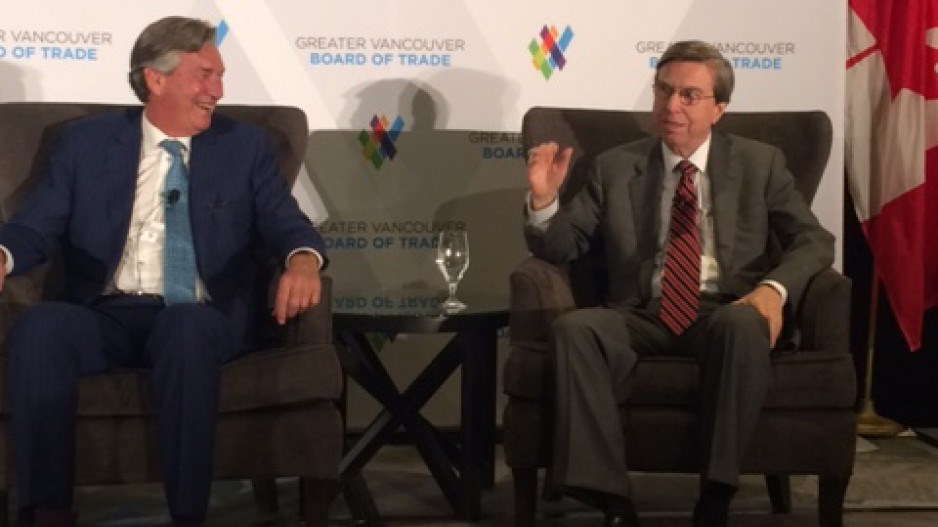Canada should get on with building its own oil pipeline, worry more about president-elect Donald Trump’s disdain for currency manipulators and less about softwood lumber – and watch more hockey.
That was some of the advice given by ambassadors to and from the U.S. at a sold-out talk Friday, November 18 – entitled President Trump: What it Means for Canada – hosted by the Greater Vancouver Board of Trade.
As the former American ambassador to Canada, Gordon Giffin gets asked a lot these days what a Donald Trump administration will mean for Canada.
“I respond by saying this election was not about you,” he said. “So move on. Once we figure out what it means for us, we’ll get back to you.
“My advice is to take a deep breath, change the channel and watch some hockey.”
But former Conservative Industry minister James Moore, who moderated Friday’s talk, said dealing with Donald Trump is or should be Prime Minister Justin Trudeau’s top priority for 2017.
“His government, for 2017 anyway, is about this now,” he said.
Asked what Trudeau should be doing to prepare, Gary Doer – former Canadian ambassador to the U.S. – said global and domestic security is the No. 1 concern for Canada and the U.S.
Canada may come under pressure to up its NATO commitments, which would include getting on with the replacement of the CF-18 fighter jets – something that has dragged on for years.
Asked about softwood lumber – B.C.’s No. 1 concern with respect to trade with the U.S. – Giffin said, “I’m stunned that softwood lumber is still an issue.”
Although the U.S. lumber industry’s main complaint is that Canada subsidizes its industry through its Crown tenure system, Giffin said it’s actually the value of the Canadian dollar that tends to be the biggest irritant.
When the Canadian dollar is weak, it gives Canadian lumber an advantage, which is one reason Canada may come under fire for its currency policies.
Although Trump has singled out China as a currency manipulator, Doer said the Bank of Canada’s own machinations have not gone unnoticed in the U.S.
When the Bank of Canada mused that it might consider negative interest rates, the Canadian dollar dropped from $0.82 against the U.S. dollar to $0.68, he said.
“We’re not immune to potentially be included as part of a currency dispute with the United States, so we should take that very seriously,” Doer said.
Giffin agreed: “Donald Trump will bring it up. And in truth, it probably should be brought up.”
More generally, Canada can expect to free trade under attack, not just from the U.S., but from within Canada as well.
Trump does not like multi-lateral trade deals, and has vowed to revisit the North American Free Trade Agreement (NAFTA) – something Prime Minister Justin Trudeau has already signaled he is willing to revisit.
But even if Trump decides to withdraw the U.S. from NAFTA, Doer pointed out that Canada still has NAFTA’s precursor agreement – the Canada-U.S. Free Trade Agreement.
He also pointed out that Canada also now has the Canada-European Union Comprehensive Economic and Trade Agreement (CETA), and potentially the Trans Pacific Partnership – providing a withdrawal by the U.S. doesn’t completely unravel the deal.
“So Canada goes into this with some strength – weaknesses sure, and liabilities, yes – but we go into this with some strength with the new administration.”
Moore asked about the implications of the Keystone XL pipeline being resurrected, and whether Canadians should be “enthusiastic” about the prospect of improving access to the U.S. for Alberta oil.
Doer said the building of pipelines in the U.S. to move Canadian oil to U.S. refineries has sometimes irritated American decision-makers, who would ask: “How come you want us to build a pipeline that’s controversial and you’re not going to do it?
Doer said he thinks Canada should focus on getting it’s own oil pipelines built.
“I believe we’ve got to have a decision in Canada to get oil to tidewater,” he said.




